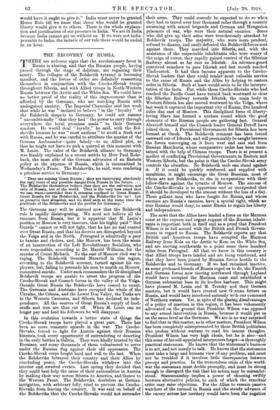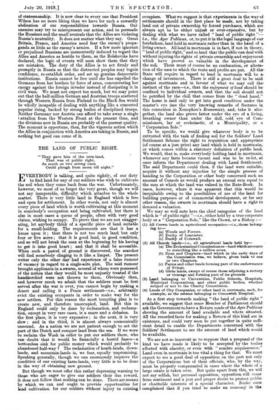THE RECOVERY OF RUSSIA. T HERE are welcome signs that the
revolutionary fever in Russia is abating, and that the Russian people, having passed through the stage of delirium, are regaining their sanity. The collapse of the Bolshevik tyranny is becoming manifest, and the forces of order are definitely reasserting themselves in conjunction with the Czecho-Slovak troops throughout Siberia, and with Allied troops in North-Western Russia between the Arctic and the White Sea. We could. have no better proof of the reality of this improvement than is afforded by the Germans, who are watching Russia with undisguised anxiety. The Imperial Chancellor said last week that while he was " inclined to believe " in the " loyalty " of the Bolshevik despots to Germany, he could not assume " unconditionally " that they had " the power to carry through everywhere the loyal promises made " to their German masters. He would. deal " loyally," he said, with the Bol- sheviks because he was " most anxious " to avoid a fresh war with Russia, and he was careful to attribute the murder of the German Ambassador—quite falsely—to an Allied plot, so that he might not have to pick a quarrel at this moment with M. 'Lenin. The value of the Bolshevik alliance to Germany was frankly explained in a recent article by Herr Paul Rohr- bach, the most able of the German advocates of an Eastern policy at the expense of Russia, which is summarized in Wednesday's Times. The Bolsheviks, he said, were rendering a priceless service to Germany :— " They are ruining Great Russia i they are destroying absolutely the very roots of any possible danger from Russia in the future. . . . The Bolsheviks themselves believe that they are the salvation, not only of Russia, but of the world. That is the very best creed that we oan want—provided that it remains waned to Great Russia. Great Russia for the Bolsheviks, and the Bolsheviks for us I Let us preserve that situation, and we shall earp at the same time the gratitude of the' olsheviks and the profits for Germany."
The Germans may well be alarmed now that the Bolshevik rule is rapidly disintegrating. We need not believe all the rumours from Russia, but it is apparent that M. Lenin's position at Moscow is very insecure, that his highly paid " Red Guards " cannot or will not fight, that he has no real control over Great Russia, and that decrees are disregarded beyond the Volga and in the North. Petrograd. is admittedly a prey to famine and cholera, and, like Moscow, has been the scene of an insurrection of the Left Revolutionary Socialists, who were responsible, according to Dr. Harold Williams, for the murder of Count Mirbach. To the east of Moscow civil war is raging. The Bolshevik General Muravieff in this region, according to the Bolshevik account, turned against his em- ployers, but, failing to persuade his men to march on Moscow, committed suicide. Under such commanders the ill-disciplined Bolshevik troops are unable to arrest the progress of the Czecho-Slovak and Cossack forces in the valley of the Volga. Outside Great Russia the Bolsheviks have ceased to count. The Germans and Austrians have occupied the whole of the Ukraine, the Crimea, and the Lower Don Valley, the Turks are in the Western Caucasus, and Siberia has declared its inde- pendence. All the sources of Great Russia's supply of food- stuffs And iron are thus cut off. When M. Lenin can no longer pay and feed his followers he will disappear.
In this evolution towards a better state of thing's the Czecho-Slovak troops haveplayed a great part. There has been no more romantic episode in the war. The Czecho- Slovaks, forced to fight for Austria against their Russian kinsmen, took every opportunity of surrendering or deserting in the early battles in Galicia. They were kindly treated by the Russians, and many thousands of them volunteered to serve under the Russian flag against their old oppressors. The Czecho-Slovak corps fought hard and well to the last. 'When the Bolsheviks betrayed their country and their Allies by concluding peace, the Czetho-Slovaks withdrew into the interior and awaited events. Last spring they decided that they could best help the cause of their nationalities in Austria by making their way across Siberia to America, and thence to the Western Front. The Bolsheviks, doubtless at German instigation, with arbitrary folly, tried to prevent the Czecho- Slovaks from leaving the country. It was said on behalf of the Bolsheviks that the Czecho-Slovaks would -not surrender their arms. They could scarcely be expected to do so when they had to travel over four thousand miles through a country swarming with armed brigands and German and Hungarian prisoners of war, who were their natural enemies. Some who did give up their arms were treacherously attacked by Bolshevik troops. The majority, who were more prudent, refused to disarm, and easily defeated the Bolshevikforcessent against them. They marched into Siberia, and, with the assistance of the respectable inhabitants who were weary of the reign of terror, they rapidly gained control of the Siberian Railway almost as far east as Irkutsk. An advance-guard contrived somehow to pass Irkutsk and last month reached Vladivostok. It had then become apparent to the Czeeho- Slovak leaders that they could render most valuable service to the cause of Russia and the Allies by helping to restore order in Siberia. Such at least would seem to be the interpre- tation of the facts. For, while those Czecho-Slovaks who had -reached the Pacific Coast have turned back westward to clear the Siberian Railway towards Irkutsk, the main body in Western Siberia has also moved westward to the Volga, where last week it captured the important city of Kazan, five hundred. miles due east of Moscow. This disciplined force of liberty- loving Slays has formed a nucleus round which the good elements of the Russian people are gathering fast. General Alexeiefl himself and the Cossack leader General Dutoff have joined them. A Provisional Government for Siberia has been formed at Omsk. The Bolshevik remnant has been forced eastward out of Irkutsk, and will presumably be caught between the forces converging on it from west and east and from Russian Manchuria, where comparative order haa been main- tained with the help of Chinese troops. There is at present a medley of conflicting Provisional Governments in Eastern and Western Siberia, but the point is that the Czecho-Slovak army controls the situation. No Bolshevik mob can stand against it. If it could be quickly reinforced and supplied with munitions, it might encourage the Great Russians, most of whom are not Bolsheviks, to rise in co-operation with their fellow-Slava against the tyrants of Moscow. The success of the Czecho-Slovaks is so opportune and so unexpected that it should be developed to the utmost without the loss of a day.
These gallant men who have fought for Russia, and whose enemies are Russia's enemies, have a special right, which no true Russian would deny, to assist Russia to regain her liberty and independence.
The news that the Allies have landed a force on the Murman coast at the express and -urgent request of the Russian inhabi- tants -is important both in itself and as a proof that President Wilson is in full accord with the British and French Govern- ments in regard to Russia. The Bolshevik reports say that British and American troops have occupied the Murman Railway from Kola on the Arctic to Kem on the White Sea, and are moving southwards to a point some three hundred miles from Petrograd. All that we know in this country is that Allied troops have landed and are being reinforced, and that they have been joined by Russian forces hostile to the Bolsheviks and to Germany. If we had remained inactive, as some professed friends of Russia urged. us to do, the Finnish and German forces now moving northward through Lapland would have occupied the.Murman coast and established a German submarine base in its ice-free harbour. This might have pleased M. Lenin and M. Trotsky and their German masters, but it would have riveted new G.; ?man fetters on Russia, and would have interfered seriously with our command of Northern waters. Yet, in spite of the glaring disadvantages of a policy of inaction in this region, it has been vehemently advocated on the ground that President Wilson was opposed to any armed intervention in Russia, because it would put us on the same level as the Germans. We are in no way surprised to find that in this matter, as in other matters, President Wilson has been completely misrepresented by those British politicians who profess without warrant to read his inmost thoughts. President Wilson has very high ideals, but he is .also—and this some of his self-appointed interpreters forget—a thoroughly practical. statesman. He knows that the statesman's business is to act, and not merely to talk. He knows that the statesman must take a large and humane view of,any problem, and.must not be troubled if it involves little discrepancies between precept and practice. In the tremendous crisis of this world- war the statesman must decide promptly, and must be strong enough to disregard the risk that his action may be misunder- stood. Statesmanship implies a power of choosing swiftly between alternative policies, to each of which the armchair critic may raise objections. For the •Allies to remain passive watchers of the turmoil in Russia and the steady advance of the enemy across her territory would have 'been the negation of statesmanship. It is now clear to every onothat.President Wilson has no more liking than we have for such a cowardly abdication, of our responsibilities towards Russia. Our enemies may try to misrepresent our action, and to persuade the Russians and the small neutrals that the Allies are violating Russia's neutrality. It does not matter what they say. Great Britain, France, and America need fear the enemy's propa- ganda as little as the enemy's armies. If a few more ignorant or prejudiced Russians are momentarily induced to regard the Allies and America as hostile to them, as the Bolsheviks have declared, the logic of events will soon show them that they are mistaken. The duty of the Allies is to act' firmly and promptly in Russia so that the distracted peoples may regain confidence, re-establish order, and set up genuine democratic institutions. Russia cannot be free until she has expelled the Germans from her borders by force of arms, concentrating her energy against the foreign invader instead of dissipating it in civil wars. We must not expect too much, but we may point out that the half-million German and Austrian troops scattered through Western Russia from Finland to the Black Sea would be wholly incapable of dealing with anything like a concerted popular rising, backed by strong bodies of disciplined troops. Neither Germany nor Austria can afford to take away a single Fattalion from the Western Front at the present time, and the divisions now in Russia are probably of the poorest quality. The moment is opportune, then, for the vigorous action which the Allies in conjunction with America are taking in Russia, and nothing but good can come of it.



























 Previous page
Previous page